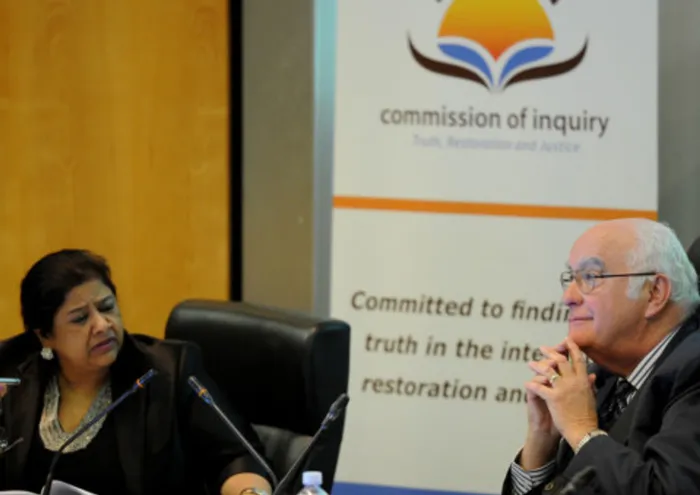Marikana commission clarifies statement

Retired judge Ian Farlam, chairperson of the Farlam Commission of Inquiry with commissioners Pingla Hemraj and Bantubonke Tokota in Centurion, Tuesday, 20 August 2013. The Farlam Commission is investigating the deaths of 44 people during strike-related unrest at Lonmin's platinum mine in Marikana last year. Picture: Werner Beukes/SAPA Retired judge Ian Farlam, chairperson of the Farlam Commission of Inquiry with commissioners Pingla Hemraj and Bantubonke Tokota in Centurion, Tuesday, 20 August 2013. The Farlam Commission is investigating the deaths of 44 people during strike-related unrest at Lonmin's platinum mine in Marikana last year. Picture: Werner Beukes/SAPA
Pretoria - The views on police evidence expressed in a statement are not those of the Farlam Commission of Inquiry, the commission said on Friday.
The statement, issued on Thursday, had contained the submissions made to the commission by senior evidence leader Geoff Budlender, SC, in support of an application for a postponement to September 25, the commission said in a statement.
Budlender wanted the postponement to enable the evidence leaders to work through the new material, running into thousands of papers. It had been made available by the SA Police Service, and the SAPS legal team to provide explanations on certain matters arising from the documents seen so far, it said.
Thursday's statement read: “In the past 10 days we have discovered through the evidence leaders that there must be info that was not disclosed by the police that seeks to suggest that the information was withheld to try and portray a certain approach to the commission in relation to what has been discovered.”
On Friday, the commission said it was important to stress three facts.
During the course of Budlender’s submissions he stated that in the opinion of the evidence leaders some of the documents obtained demonstrated that the SAPS version of the events at Marikana, as described in its presentation, and the evidence of SAPS witnesses in the commission, were in material respects not the truth.
Commission chairman, retired judge Ian Farlam, had said that that might not be so, whereupon Budlender said it was a matter for the commission, and not the evidence leaders, to decide ultimately.
Secondly, in granting the postponement sought, which was not opposed by the SAPS or any of the other parties present, Farlam had said: “I think it appropriate to place on record these are at the moment only concerns. There are no findings made, these are matters that have to be looked at, and we don’t know what the results of the examination of these points will be. But clearly from what you tell us, these are matters that require careful consideration, which I am sure they will receive.”
Finally, the commission intended keeping an open mind on the matters on which it had to make findings until the results of all the investigations, all the evidence, and all submissions were before it.
The commission, sitting in Centurion, is investigating the deaths of 44 people during strike-related unrest at Lonmin's platinum mining operations at Marikana, near Rustenburg in the North West last year.
Police shot dead 34 people, almost all of them striking mineworkers, while trying to disperse and disarm them on August 16, 2012. Ten people, including two police officers and two security guards, were killed in the preceding week.
President Jacob Zuma established the commission shortly after the unrest.
Sapa